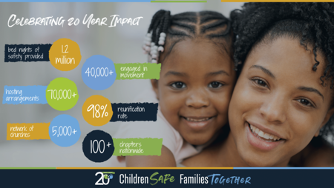By: AIF Staff
In 2018, former House Speaker and American Idea Foundation President Paul Ryan successfully fought for the passage of the Families First Prevention Services Act to be included as part of a bipartisan budget agreement. The legislation was one of the largest reforms of America’s child welfare programs in a generation.
Some of the legislation’s primary goals were to keep families intact by allowing states to receive federal support to keep children out of foster care settings, developing measures to preserve intact families, and to promote the use of evidence-based strategies in the child welfare space.
Before the legislation was passed, states would have access to federal funds (Title IV-E) only after a child was placed in the foster care system and states were “prohibited from using any Title IV-E program funds to provide services, including “counseling or treatment” intended to “ameliorate or remedy personal problems, behaviors, or home conditions.”
Speaker Ryan believed that the federal government would be able to help more children and families, not to mention better utilize taxpayer dollars, by giving states the flexibility to receive federal assistance for children before they enter the foster care system not after. The legislation also expanded the use of substance abuse treatment services and created grants and federal funding mechanisms aimed at keeping families together.
These reforms have continued to see strong bipartisan support in Congress, in large part because of the number of children in America’s foster care system. According to the Casey Foundation, in 2021, 203,770 children entered the U.S. foster care system, with 30% of those children being aged 1 to 5. These children are our most vulnerable and community leaders and policymakers have a responsibility to find evidence-based solutions that help them.
In Speaker Ryan’s mind this responsibility takes two forms: 1) work to improve the lives of children in the foster care system and 2) work even harder to prevent children from entering the foster care system in the first place.
There have been numerous studies showing that children are often better off if they stay in their own homes and receive support there as opposed to entering the foster care system. In the hopes of strengthening and building a base of evidence to support this idea, the American Idea Foundation has supported groups like Friends of the Children and Safe Families for Children, which was selected as one of the American Idea Foundation’s 2024 grant recipients.
Founded in 2003, Safe Families for Children aims to be an alternative to foster care (when appropriate) by providing families in crisis with a caring, compassionate community capable of keeping their children safe and their family together.
A faith-based organization, Safe Families for Children has three primary objectives:
1) Keep children safe during a family crisis like domestic violence, homelessness, or hospitalizations and prevent abuse and neglect,
2) Support families in crisis by providing a community support system, and
3) Reunite families and reduce the number of families entering the child welfare system.
Safe Families for Children is fueled by principles of radical hospitality, disruptive generosity, and intentional compassion. The organization uses these values to create networks of volunteers capable of supporting families and children in times of crisis. This illustration describes their wholistic, community-led approach.

Their goal is family preservation, and they work to combat the social isolation that many families face by providing community support structures. The impact is both immediate and transformative, as evidenced by Bethany’s story working with Safe Families for Children.
After 20 years and with 120 chapters across the United States, Safe Families for Children has amassed a strong track record of results. They have a network of 5,000 churches and 50,000 volunteers supporting their mission. They have a 98% reunification rate between parents and familiesand have arranged 70,000 hosting placements.This faith-based, community-focused model is having a transformative impact as they work to keep families intact and children cared for.

In part because of the Families First Prevention Services Act, more organizations working on child welfare issues are employing an evidence-based approach. Safe Families for Children is no different.
From 2016-2018, Safe Families for Children evaluated 99 families and their 216 children in Illinois over the course of a 2-year period. Among its notable findings were:
- 78% of families that received support from Safe Families for Children were diverted from protective custody, compared with 47% of non-enrolled participants.
- 89% of those working with Safe Families for Children kept their children in their homes one year after the hosting service concluded. This is compared with 65% of families not receiving their receives.
As policymakers work to improve our nation’s foster care system, they must also help prevent children from being separated from their families in the first place. This is where groups like Safe Families for Children play a crucial role. The organization is strengthening bonds in communities across the country by creating networks of support for parents and children in times of their greatest need. The American Idea Foundation is proud to team with legislators as they expand the use of evidence-based practices in the child welfare space and work with organizations like Safe Families for Children to ensure every child has a chance to thrive and prosper. To learn more about the American Idea Foundation’s 2024 grant recipients, click here.
